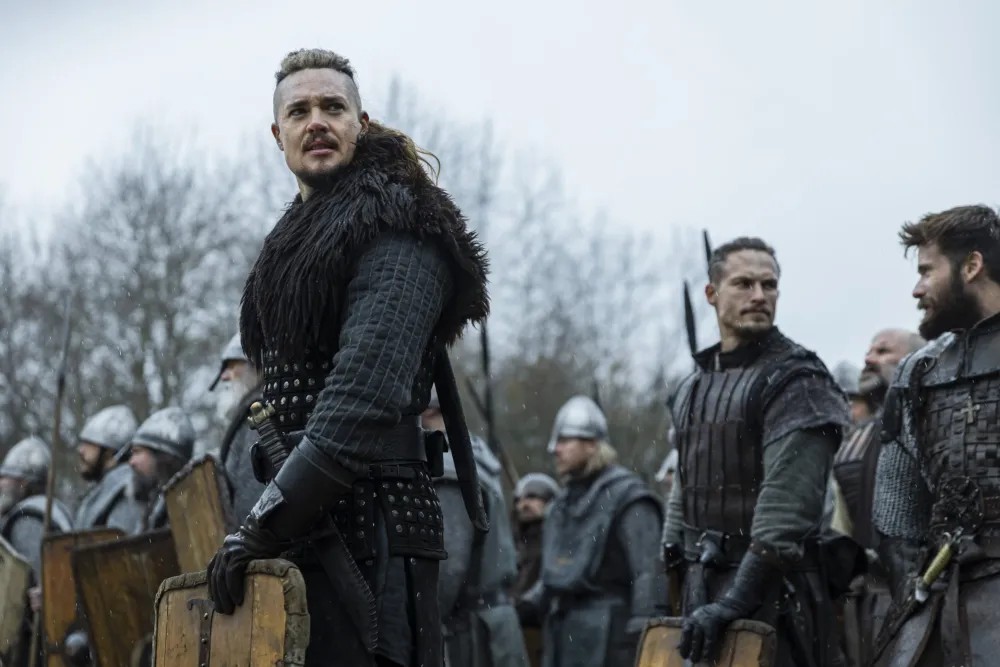The Last Kingdom: Seven Kings Must Die (2023)

“The Last Kingdom: Seven Kings Must Die,” released in 2023, is a monumental film that serves as a powerful conclusion to the acclaimed historical drama series “The Last Kingdom.” Directed by Edward Bazalgette, this film continues the saga of the medieval British Isles, blending historical intrigue with rich character development and epic battles. With its impressive cast and detailed portrayal of a tumultuous period in history, the film brings to a close a narrative that has captivated audiences and enriched the historical drama genre.
Set in the aftermath of the events of the television series, “The Last Kingdom: Seven Kings Must Die” follows the story of Uhtred of Bebbanburg (played by Alexander Dreymon), a warrior torn between the Viking and Anglo-Saxon worlds. The film explores Uhtred’s final journey as he navigates the complex political landscape of England, now fragmented and in chaos following the death of King Edward. The film delves into Uhtred’s quest to fulfill his destiny, his struggle to reclaim his ancestral home, and the broader conflict that threatens the stability of the kingdom.
As Uhtred confronts new and old foes, the film intertwines personal and political stakes, highlighting the fragile alliances and shifting power dynamics that define the era. The title, “Seven Kings Must Die,” alludes to the turbulent times when multiple claimants to the throne and a series of battles reshape the fate of England. The narrative is driven by themes of loyalty, honor, and the quest for legacy, all set against the backdrop of historical upheaval.

Edward Bazalgette, known for his work on “The Last Kingdom” series, brings a deft touch to the film’s direction. His experience with the series ensures a seamless transition from television to film, maintaining the epic scale and dramatic intensity that fans have come to expect. Bazalgette’s direction is marked by a keen understanding of the historical context and the complexities of character relationships. His portrayal of the era is both vivid and nuanced, capturing the essence of medieval warfare and political intrigue.
Bazalgette’s ability to balance large-scale battle sequences with intimate character moments is a testament to his skill as a director. The film’s action scenes are meticulously choreographed and visually stunning, while the quieter, character-driven moments offer depth and insight into Uhtred’s internal conflicts. This balance enhances the film’s overall impact, making it both an engaging historical epic and a poignant character study.

Alexander Dreymon’s portrayal of Uhtred is central to the film’s success. As the protagonist of the series, Dreymon has developed a deep connection with the character, and his performance in “Seven Kings Must Die” reflects this familiarity. Dreymon’s Uhtred is a complex figure, embodying both the warrior’s strength and the man’s vulnerability. His portrayal of Uhtred’s struggle to reconcile his past with his present is both powerful and emotionally resonant.
Dreymon’s performance is enhanced by his physical presence and charisma, which bring authenticity to Uhtred’s many battles and personal dilemmas. The actor’s ability to convey Uhtred’s inner turmoil and unyielding determination adds a layer of depth to the character, making his journey compelling and relatable.

The film features a strong supporting cast, including key figures from the series such as David Dawson, who reprises his role as King Alfred. Dawson’s performance continues to add depth to the film, reflecting the enduring impact of King Alfred’s legacy on the events of the story. Other notable cast members include Eliza Butterworth as Aelswith and Mark Rowley as Finan, both of whom contribute significantly to the film’s rich tapestry of characters.
The ensemble cast brings a range of performances that enrich the film’s narrative. The interactions between Uhtred and his allies, as well as his adversaries, are portrayed with nuance and intensity. Each character’s motivations and personal stakes are explored, adding layers to the film’s depiction of medieval politics and warfare.
“The Last Kingdom: Seven Kings Must Die” is notable for its commitment to historical accuracy, capturing the gritty realities of medieval England while weaving in dramatic elements that enhance the story. The film’s production design, costumes, and battle scenes are meticulously crafted to reflect the historical period authentically. The attention to detail in the film’s visual and thematic elements contributes to its immersive quality, allowing viewers to experience the era with a sense of realism and immediacy.
The cinematography, overseen by the film’s director of photography, is striking and evocative. The use of sweeping landscape shots, combined with close-ups of intense battle scenes, creates a dynamic visual experience that complements the film’s narrative. The visual style underscores the epic scale of the story while highlighting the personal and emotional aspects of the characters’ journeys.

“The Last Kingdom: Seven Kings Must Die” serves as a powerful and fitting conclusion to the acclaimed series, bringing the saga of Uhtred of Bebbanburg to a dramatic and satisfying end. Directed by Edward Bazalgette and featuring strong performances from Alexander Dreymon and the supporting cast, the film combines historical drama with rich character development and epic storytelling. Its depiction of medieval England, coupled with its exploration of themes of loyalty, honor, and legacy, makes it a compelling and memorable addition to the historical drama genre.
The film’s impact extends beyond its immediate narrative, offering a nuanced portrayal of a pivotal period in English history and leaving a lasting impression on audiences. “The Last Kingdom: Seven Kings Must Die” stands as a testament to the enduring appeal of historical epics and the power of storytelling to bring history to life.











